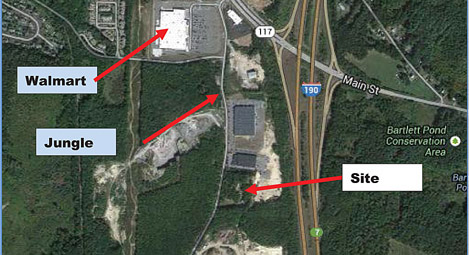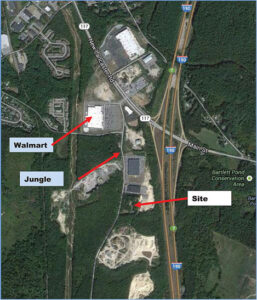

By Nancy Arsenault
Think Rt. 117 traffic is bad now? What if there were traffic heading to and from a slots parlor near the Leominster Super Wal-Mart? This location is one of three vying for the state’s single slots parlor license to be awarded in late December. The other two candidates are offering proposals in Plainville and Raynham at former racetracks.
In September, Leominster voters overwhelming approved the Live! Casino Massachusetts plan, paving the way for the city to receive $38 million over 10 years from Baltimore-based developer The Cordish Companies, along with 2.5% of gross revenue every year after that first decade.
If Cordish gets the green light in December from the Massachusetts Gaming Commission, construction would begin on a $200M, 1250-slot parlor on 16 acres, including dining and entertainment venues, expected to open in 2015. The developers have secured options on a total of 26-acres of land, with the potential to add a hotel to the property in the future. Proponents of the project, which includes 112,000 sq. ft. of gaming space, say it will produce 600 construction jobs and 600 permanent jobs, primarily drawing visitors from northern New England, Massachusetts and New York State.
While it’s a sweet financial deal for the City of Leominster, neighboring towns are not so enthusiastic. Hundreds of Lancaster residents packed a meeting at the Lancaster Community Center in October to voice concerns about the effects on their town. While most residents supported job creation and bringing new industry to the area, their main concern was the inevitable increase in traffic on Rt. 117. Developers continue to deny that any traffic impact will be felt on the eastern side of Rt. 117, beyond the highway intersection with Rt. 190.
Concern over traffic issues was also voiced by Lancaster’s neighboring town, Bolton, represented by Town Administrator Donald Lowe at the meeting. Cordish Companies’ traffic studies determined that casino goers will travel Rt. 190 and Rt. 2 to reach the gaming site, but local residents and Lowe believe otherwise. “Anyone who lives near here or in this region would not be taking those roads. They would avoid Rt. 2 at all costs and why would they take Rt. 190 and go out of their way?” he challenged.
Lowe said he personally tried Google Mapping directions from Framingham, Natick and Milford addresses, and found that all sent drivers to the casino site via Rt. 495N and Rt. 117W through Bolton.
The same was found using mapping software for communities north and west of Boston, inside and around the Rt. 128 belt, where drivers are sent along that highway to the Rt. 20/ Rt. 117 exit, and then west on Rt. 117 from Waltham to Leominster. Lowe said his traffic impact numbers show an increase in Rt. 117 traffic of 30%, not the 1 or 2% that Cordish is claiming.
Stow Police Chief Bill Bosworth commented, “We absolutely cannot handle an increase in traffic of 30% on Rt. 117 in Stow.” While he said the road capacity itself is an issue, “We also have a limited staff here and are not equipped to deal with the issues that increased casino traffic coming through Stow would generate.”
With a potential increase in traffic on weekends, evenings and holidays, the evenings would coincide with already heavy westbound commuter traffic, while weekend casino goers could easily merge with apple picking visitors to the towns along Rt. 117. He would also be concerned with casino traffic returning eastbound late at night, after a weekend or night of revelry, requiring an increased police presence on the lookout for impaired drivers.
Bosworth said it is no secret that nearby casinos are more than just traffic headaches. “It’s a fact that there is an increase in crime as a result of casinos. A casino opens and the crime rate goes up in the entire area,” he said, something that would have to be addressed by the local police departments.
Stow Town Administrator Bill Wrigley disagrees with the potential impact of the facility on Stow traffic. “Given that the casino is only 125,000 sq. ft. (less than the size of a standard Walmart) with only 1250 slots, and given the facility will be located in close proximity to a number of major roadways from the north, south, west and east, and further given that there will be major casinos located throughout the state, I have seen no traffic analysis scenario that would indicate that Stow can expect to see a troublesome increase in through traffic,” he commented.
What’s Offered to Impacted Communities
Bolton and other communities who anticipate an impact from the casino location petitioned for “Surrounding Community” status, as designated by the Cordish Companies. Lancaster has received designation as a “Surrounding Community” after hiring a law firm to advocate for this status. Now, Lancaster will receive a one-time payment of $35,000 toward police details and public safety coverage. The developers will also invest $200,000 into traffic control measures at the Rt. 190 and Rt 70 intersections with Rt. 117.
As for other towns, a boilerplate agreement was available to accept as is by October 31, or lose out completely. Towns as far away as Westminster, Templeton and Princeton accepted the one-time $5,000 payment for their designation. For Bolton, that $5,000 would be a drop in the bucket of what Lowe expects the town will have to do to mitigate traffic and public safety issues. After repeated attempts to negotiate a Bolton-specific agreement with Cordish, the town was denied its requests for additional monies toward mitigation, leaving it without Surrounding Community status at this time.
Last week, Lowe submitted an application to the Massachusetts Gaming Commission to again be considered as a Surrounding Community, based on the town’s claims of direct adverse effects. The Gaming Commission has 10 days to make a decision. If they vote in favor of the request, an arbitrator will be selected to negotiate an agreement between the Town and Cordish, to be reached within 30 days. Lowe said that a Cordish representative has already told him that if the Gaming Commission votes in favor of Bolton, it will be aggressively appealed and fought by the developer.
“This is the biggest issue to face the Town of Bolton in a very, very long time,” Lowe said on Monday, “and I am prepared to do everything to continue to pursue this for Bolton.”